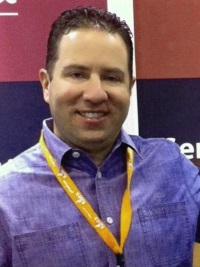Scott Nickell spends his work days calling prospects, conducting face-to-face meetings, strategizing solutions with co-workers, and giving presentations to packed rooms of industry professionals.

As Business Development Manager for a leading distribution company, success depends on Scott’s ability to effectively communicate with decision makers and convey how his company can transform their operational systems into a competitive advantage.
His daily communication requirements are demanding even for the most eloquent and powerful speakers. Though, the gift of speech isn’t something Scott takes for granted – and it isn’t something that comes naturally or easily. He lives with a stuttering condition that surfaced in his youth.
In school, his stuttering hindered his ability to socialize and diminished his self-confidence. He couldn’t say certain words and struggled to communicate each day.
After trying traditional speech therapies with no success, Scott’s parents heard about the unique behavioral therapy offered at Hollins Communications Research Institute (HCRI) in Roanoke, Virginia. They enrolled him in the intensive treatment program when he was 12 years old.
“My parents and I saw HCRI as the last shot. The ability to speak fluently meant everything to me and I was committed to giving 110 percent to the therapy program,” Scott recalled.
He found HCRI stuttering treatment unlike any other therapy experience. It was hard work and he was the youngest of 10 participants in his therapy group. Yet, HCRI clinicians provided tremendous support and guided Scott through each step in the treatment process.
According to HCRI President Ronald L. Webster, Ph.D., HCRI clinicians work one-on-one with therapy participants and help them learn new, specifically defined ways to use speech muscles that enable the ability to speak fluently. Webster and his research team invented HCRI’s comprehensive behavioral therapy approach, which has been tested with thousands of people who stutter and continually refined through the years.
“Today, the use of advanced computer technology and real-time speech measurement during therapy at HCRI makes fluency acquisition even easier and more precise for participants,” Webster said. “In addition, our post-therapy clinical support and a comprehensive package of practice tools keep participants on track with fluency throughout their lives.”
HCRI research demonstrates that 93 percent of therapy participants achieve fluent speech at the conclusion of their treatment. When evaluated two years later, 75 percent of participants maintained their fluency.
By the end of his HCRI program, Scott spoke fluently for the first time in his life. When he returned home, people could not believe how well he spoke. It was exhilarating for the 12-year-old to talk like everyone else.
However, Scott is quick to point out that it is easy to fall back to old speaking habits without ongoing practice of the speech skills he learned during treatment. In fact, he practiced his HCRI fluency techniques every day for many years.
“When you are a stutterer, how you talk is always in the back of your mind,” he said. “Even to this day, I recall my HCRI fluency training and take advantage of HCRI’s online fluency-practice tools that are available to alumni.”
Scott believes his experience with HCRI at an early age changed his trajectory in life – from his educational achievement to his career success. “I talk every single day, every single hour, as part of my job. I love what I do. I would be in a completely different line of work if it hadn’t been for HCRI. I don’t know where I would be without fluent speech,” he added.
HCRI clinicians have treated nearly 7,000 people who stutter, aged 11 to 73, from 50 countries. Clients include students, broadcasters, athletes, teachers, engineers, doctors, military personnel, business professionals, police officers, actors, paramedics, and others from all walks of life. For more information about HCRI stuttering therapy, visit www.stuttering.org.


.jpg)
